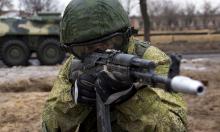Pakistan asks India to pullback forces, resume result-oriented dialogue
Pakistan called upon India on Wednesday to pull back its troops from common borders and resume result-oriented dialogue on Kashmir "instead of (making) gestures which carry little substance". Reacting to measures New Delhi has announced in deference to international pressure to de-escalate the situation in the region, a Foreign Office spokesman in the Pakistani capital, Islamabad, said: "In a situation where Indian troops are massed on Pakistan's border in a dangerous posture of confrontation, the decisions do not address the main causes of tension." "We trust that the Indian government will soon announce further steps leading to the resumption of a meaningful dialogue on disputes between the two countries, especially the core issue of Kashmir," the spokesman said. Diplomatic circles are intrigued at the steps New Delhi has taken in compliance with US persuasion to reduce tensions, which are essentially cosmetic in nature or have been dictated by India's own requirements. For instance, with the onset of monsoon deploying ships would have been a costly as well as risky proposition for India, said an observer. "We are looking for genuine steps, not peripheral or cosmetic," said President Musharraf, who is in Saudi Arabia on an official visit, in reaction to the Indian moves. The FO spokesman said Pakistan has noted with grave concern that the Indian government had intensified repression in occupied Kashmir. The assassination of All Parties Hurriyat Conference leader Abdul Ghani Lone and arrests of Hurriyat leaders like Sheikh Abdul Aziz, Syed Ali Geelani and Yasin Malik "represent a most dangerous trend in India's oppressive policies in Kashmir".
"Instead of taking the path of reason, India seems bent upon eliminating, by use of force, the Kashmiri resistance to its illegal occupation of their land," he said, scoffing at the statement made by the Indian Home Minister LK Advani on the 9th of this month, suggesting the possibility of a confederation between Pakistan and India. Such a suggestion, viewed in the context of Advani's Hindu fundamentalist agenda, his role in the destruction of the Babri Mosque, the reign of terror let loose by Indian forces in occupied Kashmir and the ongoing anti-Muslim pogroms in the Gujarat state of India, in which more than 2000 Muslim have been killed since March this year, "could only have emerged from a mind which remains irreconcilable to an independent and sovereign Pakistan".
Pakistani President Pervez Musharraf, describing India's decisions to lift a ban on Pakistani overflights and withdrawal of its navy ships from the war zone as a small beginning, stressed that a troop pullback to peace-time positions by both countries was central to de-escalating the prevailing tension. With the border face-off persisting, a substantial reduction in tensions would not come about, the president believed, saying the situation would stay 'grim' until the troops deployed along the Line of Control and the working boundary were withdrawn from offensive positions. Although he acknowledged the tension had eased to some extent as a result of a flurry of diplomatic activity aimed at convincing the South Asian nations to step back from the brink of war, he felt the need for more steps towards normality. "The situation will remain grim till we disengage on the borders. As long as the physical presence of the forces continues, the situation will remain grim."
Safiullah Gul PRAVDA.Ru Pakistan
Subscribe to Pravda.Ru Telegram channel, Facebook, RSS!





